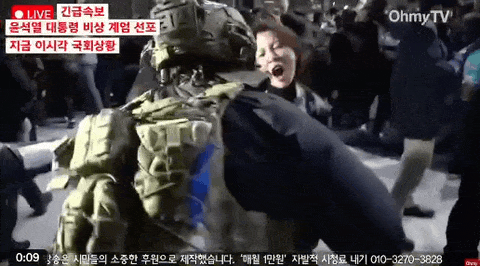
Hi Global Recap readers,
I was having a nice cup of coffee when I started getting notifications from X accounts, all in capitals:
“BREAKING: MARTIAL LAW DECLARED IN SOUTH KOREA”
Now, if you’ve been on X for a while, you know that everything is “BREAKING” all the time, and many parody accounts are just shitposting.
So no, I didn’t spit out my coffee. I stayed calm, read a bit more, and then videos of armored vehicles on the streets of Korea started popping up. That’s when it became clear:
The President of South Korea just declared martial law. 👇
🇰🇷 SOUTH KOREA
Martial Law Declared
This decision followed the opposition Democratic Party of Korea (DPK) pushing through a reduced budget bill in the parliamentary budget committee and submitting impeachment motions against a state auditor and the chief prosecutor.
According to The Martial Law Act, Article 2, Subsection 2:
“Emergency martial law shall be declared by the President for the purpose of fulfilling military necessity or maintaining the public security and order when there are belligerency or serious disturbances of social order that considerably impede the performance of the administrative and judicial functions of the State in time of war, incident or other equivalent national emergency.”
Timeline (Dec. 3rd)
10:23pm: President Yoon declares emergency martial law, blaming “anti-state forces plotting rebellion.” People were speculating whether this was due to a North Korean invasion.
(Sorry, I couldn’t find the full video of the announcement, except for this one, so please turn on the auto-translate captions for the video above)
11:00pm: The Martial Law Command issued Proclamation No. 1. This meant:
All political activities were outlawed.
Any act that denied or attempted to subvert the democratic system was prohibited.
All media were placed under its control.
All medical personnel or those on strike were required to return to their duties.
All violators could be subjected to arrest, search, and seizure without the need for a warrant.
Important note: When the President declares martial law, the National Assembly can vote by majority to demand its reversal. At this point, lawmakers were rushing to organize a vote to overturn the decision.
Midnight: Lawmakers attempting to enter the Assembly, but doors were locked and barricaded. There were police forces blocking entrances, while armed troops were breaking windows and entering the Assembly.
(The opposition claims there were attempts to arrest its leader, Lee Jae-myung)

Timeline (Dec. 4th)
1:05am: The motion to revoke martial law was introduced with a unanimous 190-0 vote.
According to the Constitution, the President is now required to comply. However, at this point, it remained uncertain whether Yoon would follow through. After all, he must have thought this through, right? Surely, such a dangerous move couldn’t be revoked so easily, could it?
1:10am: The armed forces were seen vacating the premises, but they remained on standby nearby in case the President issued an order.
At this moment, the President has not agreed to lift the martial law. In fact it took 3 more hours for him to do so.
4:25am: President Yoon agrees to lift the martial law.
Now, we wait for the fate of President Yoon.
Background
Throughout all this, Korean citizens gathered in front of the Assembly, chanting “Long live the Republic of Korea” and demanding Yoon’s impeachment and arrest.
Although this may come as a surprise, some polls show that Yoon’s approval rating dropped to as low as 17% leading up to this chaos.
Yoon served as South Korea’s Prosecutor General from 2019 to 2021. During his presidency, he has been accused of using his connections to allegedly issue search warrants against organizations and individuals who publicly disobeyed or criticized him.

🇨🇳 CHINA
China Hits Back at US

China's not taking the US chip sanctions lying down.
A day after the US announced its third crackdown on China’s chip industry, restricting exports to 140 Chinese firms, Beijing responded by announcing a ban on exports of key high-tech materials to the US, citing national security concerns.
So get this: US bans chip exports, then China bans raw materials required to make those chips.
Export Ban
China's new export ban is a big deal.
The ban includes gallium, germanium, antimony, and other materials.
These materials are crucial for making computer chips, cell phones, cars, solar panels, and military technology.
The ban took effect immediately after the announcement.
National Security
China's reasoning? National security, of course.
The Chinese Commerce Ministry cited "national security" as the reason for the ban.
The ban targets dual-use items with both military and civilian applications.
Stricter reviews are now required for graphite items shipped to the US.
US Crackdown
This move is a direct response to US actions.
The US recently launched its third crackdown in three years on China's semiconductor industry.
The crackdown includes curbs on exports to 140 Chinese firms, including Naura Technology Group.
The US added these firms to an "entity list" subject to strict export controls.
Global Impact
The ban could have significant global repercussions.
China is the biggest global source of gallium and germanium.
These materials are produced in small amounts but are essential for various high-tech products.
The White House has stated it will take "necessary steps to mitigate any Chinese coercive actions."
Future Tensions
With Trump set to take office next month, tensions are likely to escalate.
President-elect Donald Trump has threatened to raise tariffs on imports from China.
The increase in trade restrictions comes at a critical time for US-China relations.
The world will be watching closely as these two superpowers continue their high-stakes game of economic chess.

🇫🇷 FRANCE
France Faces Political Turmoil

Prime Minister Michel Barnier
France is on the brink of a political crisis as Prime Minister Michel Barnier faces a no-confidence vote that could force him to resign and leave the country without a functioning government or budget.
Is it just me, or does everything seem to be “on the brink of collapse”?
No-Confidence Vote
Prime Minister Michel Barnier could face a no-confidence vote as soon as Wednesday.
If the vote passes, Barnier will have to resign, leaving France without a functioning government.
Budget in Limbo
The budget situation is not looking too good.
Barnier pushed a budget bill through the lower house of Parliament without a vote, sparking outrage.
The budget includes around $60 billion in tax increases and spending cuts.
Without a functioning government, the budget would be dead on arrival.
Constitutional Crisis?
Is France heading for a constitutional crisis?
France's Constitution offers several scenarios to keep the country's affairs in order.
French institutions are strong, and the country’s laws provide for continuity in the absence of a government and a budget.
However, investors are already selling off French stocks and bonds, raising borrowing costs.
Macron's Dilemma
President Macron is in a tight spot.
Macron appointed Barnier in September, ignoring disastrous parliamentary election results for his party.
The leftist coalition, which won the most votes, is furious.
Macron will have to appoint a new prime minister if Barnier resigns.
Future Uncertain
The future is uncertain, and tensions are high.
The no-confidence vote is expected to pass, forcing Barnier to resign.
Macron's previous government drifted along in caretaker mode from July to September.
A caretaker government can handle current affairs but cannot propose new laws or issue new decrees.

